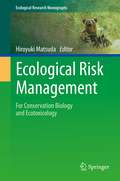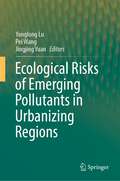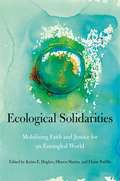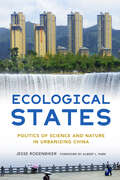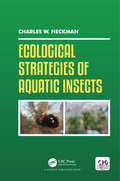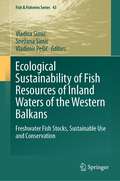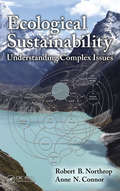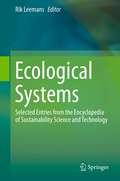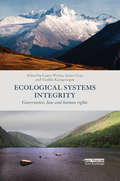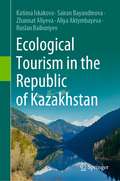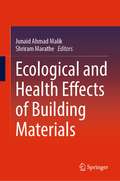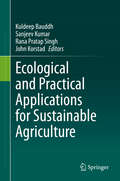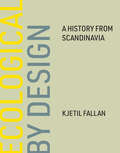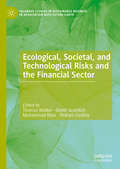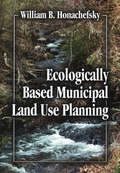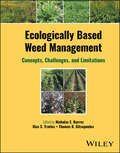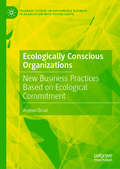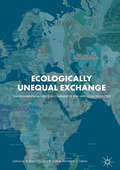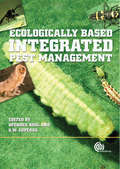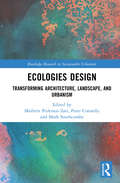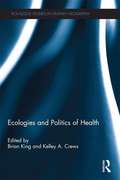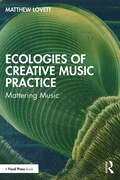- Table View
- List View
Ecological Reviews: Conflicts in Conservation
by Redpath, Stephen M. and Gutiérrez, R. J. and Wood, Kevin A. and Young, Juliette C. Stephen M. Redpath R. J. Gutiérrez Kevin A. Wood Juliette C. YoungConflicts over the conservation of biodiversity are increasing and are serious obstacles to wildlife conservation efforts worldwide. Changing patterns in land use, over-exploitation, pollution, climate change and the threat posed by invasive species all challenge the way we currently maintain and protect biodiversity - from the local management of single species to the international management of resources. Integrating approaches from different academic disciplines, policy makers and practitioners, this volume offers a radically new, cross-disciplinary, multi-scale approach to deal with conflicts. Groundbreaking strategies for conservation are analysed and a large section of the book is devoted to exploring case studies of conflict from around the world. Aimed primarily at academics, researchers and students from disciplines relating to conservation, ecology, natural resources management and environmental governance, this book will be equally valuable to conservation NGOs and practitioners, and the policy community at national and international levels.
Ecological Risk Management: For Conservation Biology and Ecotoxicology (Ecological Research Monographs)
by Hiroyuki MatsudaThis book introduces the theory and practice of ecological risk management. Using recent and live case studies in Japan, the book explains the use of basic mathematical techniques in extinction risk, adaptive population management, avian collision risk in wind farms, potential biological removal for marine mammals, and ecological risk assessment of heavy metals. The focus of this book is on case studies of nature conservation in Japan, including internationally renowned topics of Japanese fisheries, Shiretoko World Heritage, Fukushima Daiichi Nuclear Power Plant accident. It also covers the adaptive risk management of the new coronavirus disease.The book comprises four parts covering ecotoxicology, fisheries, wildlife management and conservation, and ecosystem-based management. It differs from other books in having its primary interest in human impacts on animals, plant, and ecosystems, while existing works in this area concentrate on the fate of toxic substances in the environments and their effects on humans. This book is unique in that it indicates various environmental issues that the theoretical ecology is potentially applicable without concentrating into any particular subject such as ecotoxicology or conservation biology. Primary readers are undergraduate/graduate students, staffs of environmental consultant companies and environmental NPOs, and journalists. Readers will find this book useful for its abundant information on case studies of ecological risk management and consensus building in Japan.
Ecological Risks of Emerging Pollutants in Urbanizing Regions
by Pei Wang Yonglong Lu Jingjing YuanThis book characterizes the major pollution patterns of emerging contaminants, such as sources, emission effluents, temporal and spatial distributions, multi-media transportation and transformation processes, exposure pathways to ecosystems and humans, and ecological risks. Based on this, it establishes an urbanizing region management concept and highlights how urbanization and its regional ecology have evolved into a more integrated vision. It also decouples the relations between urbanization and emissions of emerging pollutants that are framed within a broad socio-ecological context considering institutions, policies, and governance. All the theory, methods, and case studies have been taken from the authors’ publications, which have undergone rigorous international peer review. The book presents the spatial distribution, pathways, and flow diagrams of the pollutants as well as the interactions between urbanization and regional pollution and includes detailed figures and pictures. It also investigates ecological risk characterization and expression using maps based on geographic information systems to illustrate the general profile and the spatial variation of risks. The book is a valuable resource for postgraduates, researchers, academics, environmental NGOs, and regional managers such as urban planners, environmental agency staff, legal regulators, and decision makers. Bridging the gap between environmental science and policy, it offers interdisciplinary theory, approaches, and case studies that facilitate applications of frontier science in ecology and environmental science to regional social and economic development.
Ecological Solidarities: Mobilizing Faith and Justice for an Entangled World (World Christianity #1)
by Krista E. HughesOperating on the premise that our failure to recognize our interconnected relationship to the rest of the cosmos is the origin of planetary peril, this volume presents academic, activist, and artistic perspectives on how to inspire reflection and motivate action in order to construct alternative frameworks and establish novel solidarities for the sake of our planetary home.The selections in this volume explore ecologies of interdependence as a frame for religious, theological, and philosophical analysis and practice. Contributors examine questions of justice, climate change, race, class, gender, and coloniality and discuss alternative ways of engaging the world in all its biodiversity. Each essay, poem, reflection, and piece of art contributes to and reflects upon how to live out entangled differences toward positive global change.Constructive and practical, global and local, communal and personal, Ecological Solidarities is an innovative contribution to the discourses on relational and liberative thought and practice in religion, philosophy, and theology. It will be welcomed by scholars of World Christianity and theology as well as seminary students, activists, and laity interested in issues of justice and ecology.
Ecological Solidarities: Mobilizing Faith and Justice for an Entangled World (World Christianity)
by Krista E. HughesOperating on the premise that our failure to recognize our interconnected relationship to the rest of the cosmos is the origin of planetary peril, this volume presents academic, activist, and artistic perspectives on how to inspire reflection and motivate action in order to construct alternative frameworks and establish novel solidarities for the sake of our planetary home.The selections in this volume explore ecologies of interdependence as a frame for religious, theological, and philosophical analysis and practice. Contributors examine questions of justice, climate change, race, class, gender, and coloniality and discuss alternative ways of engaging the world in all its biodiversity. Each essay, poem, reflection, and piece of art contributes to and reflects upon how to live out entangled differences toward positive global change.Constructive and practical, global and local, communal and personal, Ecological Solidarities is an innovative contribution to the discourses on relational and liberative thought and practice in religion, philosophy, and theology. It will be welcomed by scholars of World Christianity and theology as well as seminary students, activists, and laity interested in issues of justice and ecology.
Ecological States: Politics of Science and Nature in Urbanizing China (The Environments of East Asia)
by Jesse RodenbikerEcological States critically examines ecological policies in the People's Republic of China to show how campaigns of scientifically based environmental protection transform nature and society. While many point to China's ecological civilization programs as a new paradigm for global environmental governance, Jesse Rodenbiker argues that ecological redlining extends the reach of the authoritarian state.Although Chinese urban sustainability initiatives have driven millions of citizens from their land and housing, Rodenbiker shows that these migrants are not passive subjects of state policy. Instead, they creatively navigate resettlement processes in pursuit of their own benefit. However, their resistance is limited by varied forms of state-backed infrastructural violence. Through extensive fieldwork with scientists, urban planners, and everyday citizens in southwestern China, Ecological States exposes the ways in which the scientific logics and practices fundamental to China's green urbanization have solidified state power and contributed to dispossession and social inequalityWith support from the Henry Luce Foundation, our goal is to produce all titles in this series both in Open Access, for reasons of global accessibility and equity, as well as in print editions.
Ecological Strategies of Aquatic Insects
by Charles W. HeckmanThis book recounts the habits of many interesting and unusual exceptions to the rule that insects are typically terrestrial forms of life. It examines the different ways that groups of species have developed modes of existence in or on the surface of water, and gives reasons why the gross morphology of insects is not favorable for life in or near bodies of water, such as wings that fail to function after coming into contact with water, rendering them useless.
Ecological Sustainability of Fish Resources of Inland Waters of the Western Balkans: Freshwater Fish Stocks, Sustainable Use and Conservation (Fish & Fisheries Series #43)
by Vladimir Pešić Vladica Simić Snežana SimićThis book provides a detailed evaluation of the hydro-ecological characteristics of the Western Balkans, an area characterized by still preserved inland waters and fish resources important for the European continent, as well as the biodiversity of inland waters important for the planet Earth. Freshwater ecosystems cover only 1% of the Earth's surface; however, they are a habitat for about 40% of fish species. At the same time, inland fisheries make less than 12% of the world's global fish catch, with 43% coming from low-income and food-deficient countries (Africa, South America, Southeast Asia). In Europe, the Western Balkans have significant fishing waters and fish resources, including the Middle Danube drainage (Sava, Drina, Velika Morava river systems), large ancient lakes (Skadar/Shkodra, Ohrid, Prespa, Dojran), and the Adriatic basin characterized by endemic and commercially important species. However, in contrast to the high fishing potential in a significant part of the Western Balkans, diverse and specific political, economic, and social factors largely had a negative impact on the state of fish resources. This volume is multidisciplinary and provides a sound knowledge base for scientific and practical fisheries. In addition, it may be a valuable guide for managers and conservationists worldwide to adapt methods and procedures for the ecological sustainability of fish resources under specific local, natural, and socio-economic conditions. Finally, the content is a good reference for natural sciences and agriculture students studying fish, fish resources, and fisheries sciences. It would improve their knowledge and perspectives on the challenges of sustainable use and conservation of inland water resources.
Ecological Sustainability: Understanding Complex Issues
by Robert B. Northrop Anne N. ConnorComplex systems is a new field of science studying how parts of a system give rise to the collective behaviors of the system, and how the system interacts with its environment. This book examines the complex systems involved in environmental sustainability, and examines the technologies involved to help mitigate human impacts, such as renewable ene
Ecological Systems
by Rik LeemansEarth is home to an estimated 8 million animal species, 600,000 fungi, 300,000 plants, and an undetermined number of microbial species. Of these animal, fungal, and plant species, an estimated 75% have yet to be identified. Moreover, the interactions between these species and their physical environment are known to an even lesser degree. At the same time, the earth's biota faces the prospect of climate change, which may manifest slowly or extremely rapidly, as well as a human population set to grow by two billion by 2045 from the current seven billion. Given these major ecological changes, we cannot wait for a complete biota data set before assessing, planning, and acting to preserve the ecological balance of the earth. This book provides comprehensive coverage of the scientific and engineering basis of the systems ecology of the earth in 15 detailed, peer-reviewed entries written for a broad audience of undergraduate and graduate students as well as practicing professionals in government, academia, and industry. The methodology presented aims at identifying key interactions and environmental effects, and enabling a systems-level understanding even with our present state of factual knowledge.
Ecological Systems Integrity: Governance, law and human rights
by Laura Westra, Janice Gray and Vasiliki KarageorgouEnvironmental law and governance are the cornerstones of global efforts to conserve the environment, protect resources and ensure fair and equitable outcomes for all of the planet's inhabitants. This book presents a series of thought-provoking chapters which consider the place of governance and law in the defence against imminent and ongoing threats to ecological, social and cultural integrity. Written by an international team of both established and early-career scholars from various disciplines and backgrounds, the chapters cover the most pressing and contemporary issues in environmental law and governance. These include access and benefit-sharing; the right to food and water; climate change coping and adaptation; human rights; the rights of indigenous communities; public and environmental health; and many more. The book has a general focus on environmental governance and law in the European Union and offers points of comparison with Canada and North and South America.
Ecological Tourism in the Republic of Kazakhstan
by Sairan Bayandinova Katima Iskakova Zhannat Aliyeva Aliya Aktymbayeva Ruslan BaiburiyevThis book analyses the theoretical and methodological foundations of ecotourism and geotourism and examines the essence, content, factors, and models of ecotourism development. The authors conducted research to assess the tourist and recreational potential of ecotourism in Kazakhstan. The study analyses the current state and describes the problems of the long-term development of ecotourism. Besides, the authors also show the role of specially protected natural areas in ecotourism development, including a list of organizations that can create tourist products in the environmental direction. This book also defines the primary conditions necessary for ecotourism in protected natural and rural areas. The resulting cartographic material visualizes the geospatial potential of the regions of Kazakhstan, aiming a more targeted expenditure of financial resources allocated to tourism development. Thus, the presented book is relevant from a practical perspective to scientists and researchers and is of value to business structures and stakeholders.
Ecological and Health Effects of Building Materials
by Junaid Ahmad Malik Shriram MaratheThis book deals with the present adverse effects of using precarious building materials on the ecology and human health. Also, the detailed discussions on the novel and greener construction materials and their utilization as an alternative to the conventional harmful existing methods and materials are also presented in the subsequent chapters. This book helps to fill the research gaps in the existing prior-art knowledge in the field of sustainable construction and green building materials and methods giving due importance to ecology and health, specifically to the fields of sustainable structural engineering, sustainable geotechnical engineering, sustainable road engineering, etc.This book helps in achieving a sustainable environment through possible adoption of innovative and ecological construction practices. Hence, this book acts as a practical workbook, mainly for the academicians and practicing engineers who are willing to work toward the consecrated building industry.It is a well-established fact that the constructions of the engineering structures consume more and more earth resources than any other human activities in the world. In addition, the construction-related activities will produce several million tons of greenhouse gases, toxic emissions, water pollutants, and solid wastes. This creates a huge impact on environment and causes severe health issues on humans and animals. It is thus important to create an eco-friendly construction environment which can satisfy the ecological and health requirements.
Ecological and Practical Applications for Sustainable Agriculture
by Rana Pratap Singh Kuldeep Bauddh Sanjeev Kumar John KorstadRampant industrialization, urbanization, and population growth have resulted in increased global environmental contamination. The productivity of agricultural soil is drastically deteriorated and requires a high dose of fertilizers to cultivate crops. To ensure food security, farmers are compelled to apply excess chemical fertilizers and insecticides that contaminate soil, air, and water. Heavy loads of chemical fertilizers not only degrade the quality of agricultural land but also pollute water and air. Use of chemical fertilizers also accelerate the release of greenhouse gases like nitrous oxide and methane along with nutrient runoff from the watershed in to lower elevation rivers and lakes, resulting in cultural eutrophication.Farming practices globally in developed, developing, and under-developing countries should utilize and promote sustainable methods through viable combined environmental, social, and economic means that improve rather than harm future generations. This can include use of non-synthetic fertilizers like compost, vermicompost, slow-release fertilizers, farmyard manures, crop rotations that include nitrogen-fixing legumes. Organic fertilizers like compost and vermicompost improve soil properties like texture, porosity, water-holding capacity, organic matter, as well as nutrient availability. The purpose of this book is to document the available alternatives of synthetic fertilizers, their mode of action, efficiency, preparation methodology, practical suggestions for sustainable practices, and needed research focus. The book will cover major disciplines like plant science, environmental science, agricultural science, agricultural biotechnology and microbiology, horticulture, soil science, atmospheric science, agro-forestry, agronomy, and ecology. This book is helpful for farmers, scientists, industrialists, research scholars, masters and graduate students, non-governmental organizations, financial advisers, and policy makers.
Ecological by Design: A History from Scandinavia
by Kjetil FallanHow ecological design emerged in Scandinavia during the 1960s and 1970s, building on both Scandinavia&’s design culture and its environmental movement.Scandinavia is famous for its design culture, and for its pioneering efforts toward a sustainable future. In Ecological by Design, Kjetil Fallan shows how these two forces came together in the late 1960s and early 1970s, when Scandinavian designers began to question the endless cycle in which designed objects are produced, consumed, discarded, and replaced in quick succession. The emergence of ecological design in Scandinavia at the height of the popular environmental movement, Fallan suggests, illuminates a little-known reciprocity between environmentalism and design: not only did design play a role in the rise of modern environmentalism, but ecological thinking influenced the transformation in design culture in Scandinavia and beyond that began as the modernist faith in progress and prosperity waned. Fallan describes the efforts of Scandinavian designers to forge an environmental ethics in a commercial design culture sustained by consumption; shows, by recounting a quest for sustainability through Norwegian wood(s), that one of the main characteristics of ecological design is attention to both the local and the global; and explores the emergence of a respectful and sustainable paradigm for international development. Case studies trace key connections to continental Europe, Britain, the US, Central America, and East Africa. Today, ideas of sustainability permeate design discourse, but the historical emergence of ecological design remains largely undiscussed. With this trailblazing book, Fallan fills that gap.
Ecological, Societal, and Technological Risks and the Financial Sector (Palgrave Studies in Sustainable Business In Association with Future Earth)
by Thomas Walker Dieter Gramlich Mohammad Bitar Pedram FardniaToday’s financial sector faces multiple challenges stemming from ecological, societal, and technological risks such as climate change, political extremism, and cyber-attacks. However, these non-traditional risks are yet to be fully identified and measured, in order to ensure their successful management. This edited collection sheds light on the topic by examining the unique measurement and modelling challenges associated with each of these risks, and their interaction with finance. Offering a comprehensive analysis of non-traditional finance risks, the authors provide the basis for developing appropriate risk management techniques. With new approaches to protect against emerging threats to the financial sector, this edited collection will appeal to academics researching sustainability, development finance, and risk management, as well as policy-makers and practitioners within the banking sector.
Ecologically Based Municipal Land Use Planning
by William B HonachefskyIn the decades following the first Earth Day in 1970, a generation has been enlightened about the unspeakable damage done to our planet. Federal, state, and local governments generated laws and regulations to control development and protect the environment. Local governments have developed environmental standards addressing their needs. The result-an ecologically incongruous pattern of land development known as urban sprawl.Local land use planners can have a greater effect on the quality of our environment than all of the federal and state regulators combined. Historically, they have existed on the periphery of land management. The author suggests that federal and state environmental regulators need to incorporate local governments into their environmental protection plans. Ecologically Based Municipal Land Use Planning provides easily understood, nuts and bolts solutions for controlling urban sprawl, emphasizing the integration of federal, state, and local land use plans.The book discusses ecological resources and provides practical solutions that municipal planners can implement immediately. It discusses the most recent scientific data, how to extract what is important, and how to apply it to the local land planning process. The author includes the application of the Geographic Information Systems (GIS) to problem solving.Despite compelling evidence and sound arguments favoring the implementation of an ecologically sensitive approach to land use planning, municipal planners, in general, remain skeptical. It will take considerably more encouragement and education to win them over completely. Ecologically Based Municipal Land Use Planning makes the case for sound land use policies that will reduce sprawl.
Ecologically Based Weed Management: Concepts, Challenges, and Limitations
by Nicholas E. Korres Ilias S. Travlos Thomas K. GitsopoulosEcologically Based Weed Management Protect crop yields and strengthen ecosystems with this essential guide Research into weed management is an increasingly critical component of both environmental stewardship and food production. The potential cost of weed propagation can be measured in crop yield reductions, under-nourished populations, stymied economies, and more. The propagation of herbicide-resistant weed populations means that purely chemical weed management is no longer viable; food production can now be secured only with an ecological approach to weed control. Ecologically Based Weed Management details such approaches and their potential to manage weeds across a range of agricultural and environmental contexts. It emphasizes the deployment of ecological principles to prevent weed infestations, reduce crop losses, and strengthen ecosystems. In a time when growing population and changing climates are placing enormous pressure on global food production, this approach to weed management has never been more vital. Ecologically Based Weed Management readers will also find: A global team of expert contributors to a multidisciplinary approach Detailed discussion of topics like herbicide limitation, integrated weed management, and more Insights pertinent to agriculture, academia, government, industry, and more Ecologically Based Weed Management is ideal for researchers in agriculture chemistry, weed science, agronomy, ecology, and related fields, as well as for regulators and advanced students.
Ecologically Conscious Organizations: New Business Practices Based on Ecological Commitment (Palgrave Studies in Sustainable Business In Association with Future Earth)
by András ÓcsaiThis book investigates the value orientation of ecologically conscious business. It analyzes, in a systematic and comparative way, the value commitments and business models of exemplary ecologically conscious businesses from around the world.Ecological consciousness is gaining importance in modern business thinking, as the effects of the Anthropocene – acidification of oceans, diminishing potable water, climate change, and decreasing biodiversity – are becoming more evident. Surviving this ecological crisis requires a radical inner transformation of humanity, and an ecological transformation of business and the economy.This book is valuable reading for masters and Ph.D. students, as well as academics, business practitioners, and policymakers who are working in the field of business ethics, business and the natural environment, business and society, sustainability, and corporate social responsibility. It also serves as general reading for reflective practitioners who are interested in progressive, ecologically conscious businesses, ethical business functioning, and business model innovation.
Ecologically Unequal Exchange: Environmental Injustice in Comparative and Historical Perspective
by Harry F. Dahms R. Scott Frey Paul K. GellertAt a time of societal urgency surrounding ecological crises from depleted fisheries to mineral extraction and potential pathways towards environmental and ecological justice, this book re-examines ecologically unequal exchange (EUE) from a historical and comparative perspective. The theory of ecologically unequal exchange posits that core or northern consumption and capital accumulation is based on peripheral or southern environmental degradation and extraction. In other words, structures of social and environmental inequality between the Global North and Global South are founded in the extraction of materials from, as well as displacement of waste to, the South. This volume represents a set of tightly interlinked papers with the aim to assess ecologically unequal exchange and to move it forward. Chapters are organised into three main sections: theoretical foundations and critical reflections on ecologically unequal exchange; empirical research on mining, deforestation, fisheries, and the like; and strategies for responding to the adverse consequences associated with unequal ecological exchange. Scholars as well as advanced undergraduate and graduate students will benefit from the spirited re-evaluation and extension of ecologically unequal exchange theory, research, and praxis.
Ecologically-based Integrated Pest Management
by Opender Koul Gerrit W. CuperusIntegrated pest management (IPM) is a sustainable approach to manage pests through biological, cultural, physical and chemical means in order to minimize economic and environmental injury caused by such pests. Any comprehensive IPM programme requires an understanding of the ecological relationships between crops, pests, natural enemies and the environment. This book presents a series of review chapters on ecologically-based IPM. Topics covered range from the ecological effects of chemical control practices to the ecology of predator-prey and parasitoid-host systems.
Ecologies Design: Transforming Architecture, Landscape, and Urbanism (Routledge Research in Sustainable Urbanism)
by Peter Connolly Maibritt Pedersen Zari Mark SouthcombeThe notion of ecology has become central to contemporary design discourse. This reflects contemporary concerns for our planet and a new understanding of the primary entanglement of the human species with the rest of the world.The use of the term ‘ecology’ with design tends to refer to how to integrate ecologies into design and cities and be understood in a biologically-scientific and technical sense. In practice, this scientific-technical knowledge tends to be only loosely employed. The notion of ecology is also often used metaphorically in relation to the social use of space and cities. This book argues that what it calls the ‘biological’ and ‘social’ senses of ecology are both important and require distinctly different types of knowledge and practice. It proposes that science needs to be taken much more seriously in ‘biological ecologies’, and that ‘social ecologies’ can now be understood non-metaphorically as assemblages. Furthermore, this book argues that design practice itself can be understood much more rigorously, productively and relevantly if understood ecologically. The plural term ‘ecologies design’ refers to these three types of ecological design. This book is unique in bringing these three perspectives on ecological design together in one place. It is significant in proposing that a strong sense of ecologies design practice will only follow from the interconnection of these three types of practice. Ecologies Design brings together leading international experts and relevant case studies in the form of edited research essays, case studies and project work. It provides an overarching critique of current ecologically-oriented approaches and offers evidence and exploration of emerging and effective methods, techniques and concepts. It will be of great interest to academics, professionals and students in the built environment disciplines.
Ecologies and Politics of Health: Ecologies And Politics Of Health (Routledge Studies in Human Geography)
by Brian King Kelley A. CrewsHuman health exists at the interface of environment and society. Decades of work by researchers, practitioners, and policy-makers has shown that health is shaped by a myriad of factors, including the biophysical environment, climate, political economy, gender, social networks, culture, and infrastructure. Yet while there is emerging interest within the natural and social sciences on the social and ecological dimensions of human disease and health, there have been few studies that address them in an integrated manner. Ecologies and Politics of Health brings together contributions from the natural and social sciences to examine three key themes: the ecological dimensions of health and vulnerability, the socio-political dimensions of human health, and the intersections between the ecological and social dimensions of health. The thirteen case study chapters collectively present results from Africa, Asia, Latin America, the United States, Australia, and global cities. Section one interrogates the utility of several theoretical frameworks and conventions for understanding health within complex social and ecological systems. Section two concentrates upon empirically grounded and quantitative work that collectively redefines health in a more expansive way that extends beyond the absence of disease. Section three examines the role of the state and management interventions through historically rich approaches centering on both disease- and non-disease-related examples from Latin America, Eastern Africa, and the United States. Finally, Section four highlights how health vulnerabilities are differentially constructed with concomitant impacts for disease management and policy interventions. This timely volume advances knowledge on health-environment interactions, disease vulnerabilities, global development, and political ecology. It offers theoretical and methodological contributions which will be a valuable resource for researchers and practitioners in geography, public health, biology, anthropology, sociology, and ecology.
Ecologies of Care in Times of Climate Change: Water Security in the Global Context
by Michael BuserAvailable open access digitally under CC BY NC ND licence. This book investigates and analyses places in Europe, North America and Asia that are facing the immense challenges associated with climate change adaptation. Presenting real-world cases in the contexts of coastal change, drinking water and the cryosphere, Michael Buser shows how the concept of care can be applied to water security and climate adaptation. Exploring the everyday and often hidden ways in which water security is accomplished, the book demonstrates the pervasiveness and power of care to contribute to flourishing lives and communities in times of climate change.
Ecologies of Creative Music Practice: Mattering Music
by Matthew LovettEcologies of Creative Music Practice: Mattering Music explores music as a dynamic practice embedded in contemporary ecological contexts, one that both responds to, and creates change within, the ecologies in which it is created and consumed. This highly interdisciplinary analysis includes theoretical and practical considerations – from blockchain technology and digital platform commerce to artificial intelligence and the future of work, to sustainability and political ecology – as well as contemporary philosophical paradigms, guiding its investigation through three main lenses: How can music work as a conceptual tool to interrogate and respond to our changing global environment? How have transformations in our digital environment affected how we produce, distribute and consume music? How does music relate to matters of political ecology and environmental change? Within this framework, music is positioned as a starting point from which to examine a range of contexts and environments, offering new perspectives on contemporary technological and ecological discourse. Ecologies of Creative Music Practice: Mattering Music is a valuable text for advanced undergraduates, postgraduates, researchers and practitioners concerned with producing, performing, sharing and listening to music.

